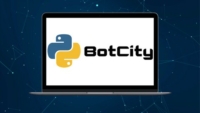
Complete UiPath RPA Developer Course: Build 7 Robots
Master Robotic Process Automation (RPA) and UiPath – go from beginner to advanced.
Created by Leon Petrou | 30 hours on-demand video course
Welcome to the Complete UiPath RPA Developer Course: Build 7 Robots Course where you will learn everything you need to know to get started as a Robotic Process Automation (RPA) developer. Learn and master UiPath Studio and then build state-of-the-art software robots from scratch.
The best part about this course is that this course is entirely project-based, which means you will be getting hands-on experience and learn the skills you need on how to build real-world software robots in an enterprise setting. So if you’re the type of person who ‘learns by doing’, then this course is for you.
We start off by learning what RPA is, how to choose the best processes fit for RPA, installing UiPath onto your machine and then building your first simple robot. We then explore UiPath Studio learning all about the user interface to get a basic understanding on how to use UiPath Studio. Once we cover all the basics we then take a deep dive into building real-world software robots ranging in complexity from beginner to advanced.
What you’ll learn
- Design, develop and deploy state-of-the-art RPA robots.
- Automate 7 real-world business processes from scratch.
- Master the UiPath Framework and learn RPA best practices.
- Analyse and identify processes that are best fit for RPA.
- Confidently tackle the UiPath activities that are most commonly used in enterprise solutions.
Recommended Course
UiPath 2025 – Level 1 RPA Developer Best seller
RPA with Python and BotCity – Build and Manage Automations
Robotics and ROS 2 – Learn by Doing! Manipulators
Who this course is for:
- Beginners to UiPath curious about Robotic Process Automation (RPA).
- Anyone who wants to land a high-paying RPA developer / architect / analyst job in the near future.
- White-collar employees wanting to save time, reduce errors, and improve efficiency by automating common business tasks.
- Business leaders who want to automate business processes.












